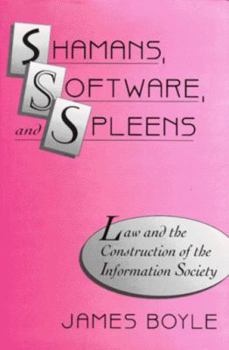Shamans, Software, and Spleens: Law and the Construction of the Information Society
Select Format
Select Condition 
Book Overview
Who owns your genetic information? Might it be the doctors who, in the course of removing your spleen, decode a few cells and turn them into a patented product? In 1990 the Supreme Court of California... This description may be from another edition of this product.
Format:Hardcover
Language:English
ISBN:0674805224
ISBN13:9780674805224
Release Date:May 1996
Publisher:Harvard University Press
Length:270 Pages
Weight:1.45 lbs.
Dimensions:1.1" x 6.5" x 9.5"
Customer Reviews
3 ratings
Information Economics meets Legal Realism
Published by Thriftbooks.com User , 22 years ago
In a wonderful exposition of contemporary thinking on how markets and institutions produce and distribute information and knowledge, James Boyle gives readers some powerful analysis and some of the conceptual tools they'll need to make the Judge Posner's and Richard Epstein's of the world squirm a bit given their desire to wish away the complex issues Legal Realism raised regarding property and contract law. Markets, property, privacy, information and knowledge are all social constructs which generate asymmetries of power and Professor Boyle shows the potential for mischief that may occur if workers, citizens, economists and attorneys refuse to rethink what kind of power relations, if any, are consistent with democratic norms. By looking at such issues as "what is an author" [what is epistemic agency] and the issue of self-ownership of our bodies, Boyle creates a collage of juxtapositions that are of immense relevance to issues such as whether what happened at Enron and other corporations is a manifestation of insider trading, what shall be the scale and scope of patents and copyrights given the need to balance "efficiency" and equity and access, how shall we handle the commodification of our bodies and thoughts?All of these are tough issues that are never going to go away and Boyle's choice of using Legal Realism as mode of inquiry into how we will shape the future of entitlements to knowledge and it's pecuniary benefits is probably the best choice that can be made for those who see glaring limitations in libertarianism.The one topic, that in my view is critical for carrying the discussion forward, yet is missing from Boyle's analysis, is employment contracts. The self-ownership thesis as applied to the knowledge in workers heads, as Kenneth Arrow, Michael Perelman, David Ellerman and others have pointed out, raises difficult issues for corporate governance and the rights of workers. Information economics has many unexplored vistas related to labor law; who owns the knowledge of the firm, under what conditions are workers entitled to privacy from their fellow workers - an immense topic given how corporate hierarchies generate huge asymmetries of power at work and the resulting distribution of income. Hopefully Professor Boyle and his colleagues will take up these critical issues in the future.As for the other reviewers anxieties concerning Karl Marx, their fears are completely unfounded.
A brilliant analysis of law, information and the market.
Published by Thriftbooks.com User , 26 years ago
I have both just finished Boyle's book and his Torts class at Washington College of Law. Boyle's analysis is strikingly clear. Taking as one of his launching-off points the important California Supreme Court decision in Moore V. Regents of California, Boyle tackles issues ranging from the commodification and distribution of information to the creation of legally protected property interests in biology. He exposes that courts make decisions based not so much on ahistorical, immutable legal principles but on policy considerations often directly related to contemporary trends in economic thinking. Boyle, despite several references to Marx, is a defender of a uniquely American kind of privatized safety regime in the form of the tort system. This has confused careless readers as evidenced by Huber in the pages of the NYT.
excellent, read it.
Published by Thriftbooks.com User , 27 years ago
Simply the best book on the problems of the category 'information' as used in the popular terms 'information economy' or 'information society'. Boyle details both the legal and economic incoherencies of the term in detail. As the reviews above point out there is much fascinating detail about the proceedures of copyright and intellectual property law in action. It is true that some people won't like this book, and will raise their hands in horror at the mentions of Marx, but this is their loss. The fact that Marx has been used to justify totalitarian states dosn't mean he dosn't have interesting things to say on occasion, and the book is hardly doctrinaire 'marxist'. There are ethical and analytic problems in our current usage of copyright, which will absolutely cripple any attempts to implement the "information wants to be free" slogan, and there's no reason to think that leaving these problems to the market or the law courts alone will solve them. I know of no other author who has really tried to grip with these problems- so even if you are going to disagree with him, read him. If it doesn't make you think, I don't know what will.






